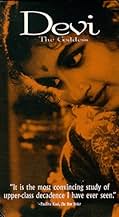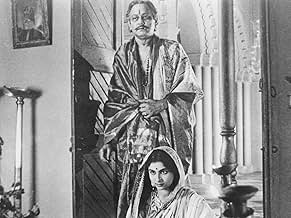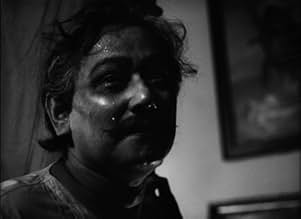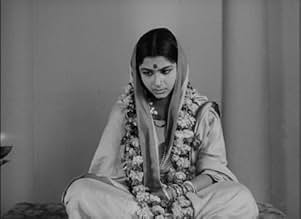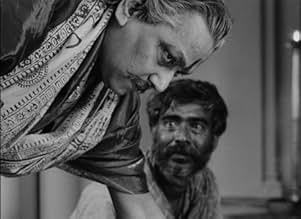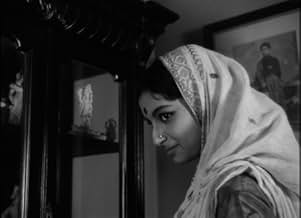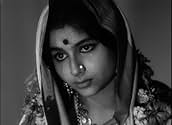IMDb RATING
7.7/10
3.1K
YOUR RATING
A young woman is deemed a goddess when her father-in-law, a rich feudal land-lord, has a dream envisioning her as an avatar of Kali.A young woman is deemed a goddess when her father-in-law, a rich feudal land-lord, has a dream envisioning her as an avatar of Kali.A young woman is deemed a goddess when her father-in-law, a rich feudal land-lord, has a dream envisioning her as an avatar of Kali.
- Director
- Writers
- Stars
- Awards
- 1 win & 1 nomination total
Soumitra Chatterjee
- Umaprasad
- (as Soumitra Chattopadhyay)
Karuna Bannerjee
- Harasundari
- (as Karuna Bandyopadhyay)
Purnendu Mukherjee
- Taraprasad
- (as Purnendu Mukhopadhyay)
Arpan Chowdhury
- Khoka - Child
- (as Shriman Arpan Chowdhury)
Anil Chatterjee
- Bhudeb
- (as Anil Chattopadhyay)
- Director
- Writers
- All cast & crew
- Production, box office & more at IMDbPro
Featured reviews
A film that explores the line between the good aspects of faith (e.g. humility) and the bad (e.g. ignorance) when an elderly man has a dream that his daughter-in-law is the incarnation of the goddess Kali, and immediately begins venerating her. In Hinduism the idea of one of the deities from its pantheon incarnating as a mortal is fairly common and has some interesting and profound philosophical implications, but here we feel a deep sense of falseness and unease. When the young woman's husband returns to find her on a dais surrounded by chanting worshippers he eventually tries to get her out of there, but she begins to wonder whether she might indeed be Kali, and if leaving may cause the gods to inflict their wrath upon him. It all seems a little crazy - a single fleeting moment in an old man's dream, and suddenly streams of people are coming to a trapped young woman, some bearing sick children and expecting her to heal them.
Before the dream, the old man has a somewhat creepy relationship with her - for example, calling her 'mother' and praising her while she waits on him and tenderly washes his feet. Later we find out she's just 17 years old, and has been married for 3 years, causing some uncomfortable internal math even if it is based on the reality of 19th century India (and apparently a true story). Sharmila Tagore plays the conflicted aspects of the part well, and she was only 16 years old. I found that the film was an interesting look into the culture - and director Satyajit Ray's criticism of blind faith - but the pace of the film was a little too slow for what is a pretty simple story. It finishes strong though, and with some powerful images of Tagore.
Before the dream, the old man has a somewhat creepy relationship with her - for example, calling her 'mother' and praising her while she waits on him and tenderly washes his feet. Later we find out she's just 17 years old, and has been married for 3 years, causing some uncomfortable internal math even if it is based on the reality of 19th century India (and apparently a true story). Sharmila Tagore plays the conflicted aspects of the part well, and she was only 16 years old. I found that the film was an interesting look into the culture - and director Satyajit Ray's criticism of blind faith - but the pace of the film was a little too slow for what is a pretty simple story. It finishes strong though, and with some powerful images of Tagore.
Examining the dangers of blind faith & superstitious beliefs through the adversity of a young woman who finds herself deified by her father-in-law following a vivid dream, Devi captures the absurdity of religious delusion and the oppressive role a patriarchal society plays by not giving women their own voice even when they are held to a divine status.
Written & directed by Satyajit Ray (The Apu Trilogy & The Music Room), the story aptly introduces us to all the characters before the main plot surfaces but once it kicks into action, things only get more tragic & heartbreaking from there on. Ray makes sure his critique doesn't mock the Hindu religion, and is mainly concerned with the grave consequences of such blind conviction.
The religious fervour that erupts from one man's idiotic interpretation of a dream is depicted with both honesty & understanding. The splendid camerawork, steady pace & skilful editing do their part but what makes the ride so gripping, involving & interesting is the strong & sincere performances from the committed cast, with Sharmila Tagore impressing the most in the designated titular role.
Overall, Devi (The Goddess) is yet another socially relevant film from Satyajit Ray that tackles a sensitive subject matter with elegance & composure, and delivers a rich, evocative & thought-provoking experience. As is the case with most films of this esteemed auteur, the story brims with a timeless quality, the social themes it addresses have a universal appeal, and the sensible storytelling makes it worth a shot.
Written & directed by Satyajit Ray (The Apu Trilogy & The Music Room), the story aptly introduces us to all the characters before the main plot surfaces but once it kicks into action, things only get more tragic & heartbreaking from there on. Ray makes sure his critique doesn't mock the Hindu religion, and is mainly concerned with the grave consequences of such blind conviction.
The religious fervour that erupts from one man's idiotic interpretation of a dream is depicted with both honesty & understanding. The splendid camerawork, steady pace & skilful editing do their part but what makes the ride so gripping, involving & interesting is the strong & sincere performances from the committed cast, with Sharmila Tagore impressing the most in the designated titular role.
Overall, Devi (The Goddess) is yet another socially relevant film from Satyajit Ray that tackles a sensitive subject matter with elegance & composure, and delivers a rich, evocative & thought-provoking experience. As is the case with most films of this esteemed auteur, the story brims with a timeless quality, the social themes it addresses have a universal appeal, and the sensible storytelling makes it worth a shot.
'Devi' is so good I went out and bought the whole 'Apu Trilogy.' Which was expensive, and I'm poor. 'Devi' is so good that I've watched it enough times to be able to mouth along to it in Bengali, and I don't speak Bengali. "Khoka khotay?" "Aaaa... cheko ta." (I'm now learning Bengali because I love this movie so much!)
There is such an intricate web of relationships between the characters, that it reminds me of Macbeth. The story is very specifically about the Indian culture (it's revealing investigation into Hinduism could have happened nowhere else) but its tale of strife between generations is something anyone can understand and feel.
If you would like to talk about this film, please email me! "Namoskar." (I'm pretty sure that means 'goodbye!')
There is such an intricate web of relationships between the characters, that it reminds me of Macbeth. The story is very specifically about the Indian culture (it's revealing investigation into Hinduism could have happened nowhere else) but its tale of strife between generations is something anyone can understand and feel.
If you would like to talk about this film, please email me! "Namoskar." (I'm pretty sure that means 'goodbye!')
This film was made in 1960. This is interesting because it is highly doubtful that the same film could be made in India today, in spite of India's massive film industry. The film does a great depiction of the crisis faced by people struggling to be modern yet encumbered with the traditional systems and the specter of having been colonized.
The younger son is ready to walk away from the bondage of traditional and as he sees, the superstition of the traditional life. Of course, he is reaping the benefit of life as a high caste. His young wife becomes the Devi - the embodiment of the goddess. This film also works well for its psychological content for the way we see the father project his desires onto those around him, and the choices faced by each character. In light of the fundamentalism worldwide - Christian, Muslim & Hindu - it is hard to image that this film could be made today in India since it leans to a skeptical view of Darsan and the goddess.
The younger son is ready to walk away from the bondage of traditional and as he sees, the superstition of the traditional life. Of course, he is reaping the benefit of life as a high caste. His young wife becomes the Devi - the embodiment of the goddess. This film also works well for its psychological content for the way we see the father project his desires onto those around him, and the choices faced by each character. In light of the fundamentalism worldwide - Christian, Muslim & Hindu - it is hard to image that this film could be made today in India since it leans to a skeptical view of Darsan and the goddess.
After watching Satyajit Ray's The Apu Trilogy (1955-1959), which are now my favourite films of all time, I was looking forward to watching Devi, the next film Ray directed after The Apu Trilogy. Although I couldn't feel the same kind of emotional connection with the characters in Devi that I felt in The Apu Trilogy, this film was thought-provoking and very intriguing to watch.
Devi dealt with a serious issue in Bengali society at the time in a mature manner and Ray's direction and cinematography for this film was just as superb as The Apu Trilogy. It starred Soumitra Chatterjee and Sharmila Tagore once again as a married couple, like in Apur Sansar (the final part of The Apu Trilogy). However, whereas it was Soumitra who played the lead role in Apur Sansar, this time it's Sharmila who plays the lead role in Devi. Her performance was very subtle for the first half but her delusional performance towards the end was very convincing. Overall, I'd highly recommend this movie to any Satyajit Ray fan.
8/10
Devi dealt with a serious issue in Bengali society at the time in a mature manner and Ray's direction and cinematography for this film was just as superb as The Apu Trilogy. It starred Soumitra Chatterjee and Sharmila Tagore once again as a married couple, like in Apur Sansar (the final part of The Apu Trilogy). However, whereas it was Soumitra who played the lead role in Apur Sansar, this time it's Sharmila who plays the lead role in Devi. Her performance was very subtle for the first half but her delusional performance towards the end was very convincing. Overall, I'd highly recommend this movie to any Satyajit Ray fan.
8/10
Did you know
- TriviaSharmila Tagore was just 15 when she filmed this role.
- Quotes
Kalikinkar Roy: [while Doyamoyee strokes his feet] Do you know who I'm worried about? I'm worried about your Christian husband. You never know the intention of boys today.
- ConnectionsFeatured in The Story of Film: An Odyssey: Sex & Melodrama (2011)
- How long is The Goddess?Powered by Alexa
Details
- Release date
- Country of origin
- Language
- Also known as
- The Goddess
- Filming locations
- See more company credits at IMDbPro
Box office
- Gross US & Canada
- $93,215
- Runtime1 hour 33 minutes
- Color
- Sound mix
- Aspect ratio
- 1.37 : 1
Contribute to this page
Suggest an edit or add missing content



